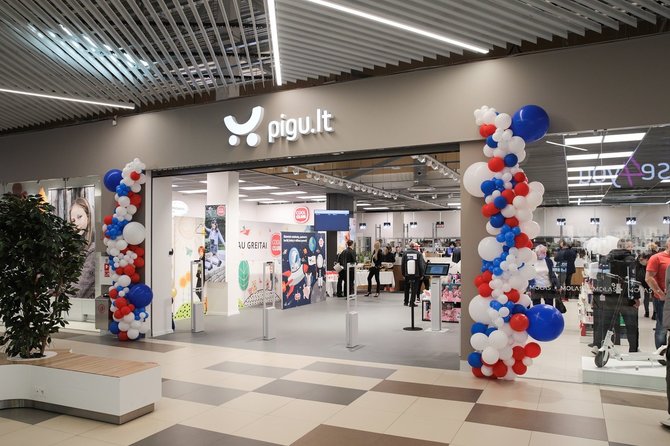According to representatives from the fashion industry, the pandemic has changed realities for the fashion sector and made e-commerce an inseparable aspect of the shopping experience.
Representatives of the fashion category say last year was highly challenging for the sector. As a result of the pandemic, businesses trading in clothing, footwear, and accessories lost their primary sales channel as physical store doors closed.
Roger Puks, the representative for Baltika Group, which manages brands such as Baltman, Monton and Ivo Nikkolo, says that the coronavirus pandemic has caused unexpected challenges for the company.
“With the closure of the usual traditional trade channels, we were forced to invest into e-retail, and we expanded the company’s e-commerce department from a single person to ten. At the same time, to present our goods to the client, which can be purchased at physical stores and deliver within a few days, we had to reorganise our entire logistics chain. It appears that other players in the sector were met with the same fate,” he says.
E-commerce helped stand up again
UAB Lifestyle Trade retail chief Skirmantė Liutkutė recounts how the difficult circumstances also forced their company to transition to online operations: “After shifting to retailing online, we were convinced that its specifics differ from physical retail. We had to invest more into goods presentation: carefully selecting a photo for each item and making an appealing text translation into the Baltic States’ languages. However, all the investment into e-tailing paid off.”
Lifestyle Trade, which represents the brand Puma, began e-tailing through Pigu.lt, and representatives for the Italian handbag and suitcase manufacturer Carpisa also joined the platform in the local market and starting sales in Lithuania and Estonia. Kitija Reinfelde, a board member for the firm that manages the brand, adds that the company had to close its physical stores in Latvia when the pandemic began. However, they were able to transform the emerging challenges into opportunities: “When we started online sales, during peak times we observed a 90 per cent growth in orders, and today we also see rapid growth for the online retailer 220.lv with a 30 per cent monthly increase. We expect a similar pace soon in Lithuania and Estonia.”
E-commerce and the fashion industry – no longer competitors
Fashion industry representatives are unanimous about the potential of e-commerce, noting that e-tailing has become one of the main shopping channels and that this will not change soon.
“Having diverse retail channels is the future of the fashion industry. E-tailing allows us to reach new customers who live more remotely and might have never paid a visit to our physical storefronts. We hope that in the future, both physical and online sales will grow,” says Lifestyle Trade retail head S. Liutkutė.
Roger Puks adds that the pandemic resulted in e-tailing becoming an inseparable attribute of the fashion sector and that it now complements physical retail, which will have to follow down the path trodden by e-commerce: “With e-tailing volumes rising, consumer expectations are also on the rise. They want to receive their purchased items as soon as possible. So, fashion industry companies will have to perfect their internal business processes and ensure that goods collection and consumer emotional experiences are the same quality at both physical and online stores.”
Growth due to changed customer habits
According to Pigu.lt marketing head Ernestas Kačerauskas, the reason for the growth in the fashion category is changes to consumer habits, as well as customers increasingly observing advantages to e-commerce: a larger variety to choose from, safe shopping, the opportunity to save time and choose not only the best price but also use the most convenient payment and delivery methods.
“Previously, consumers couldn’t even imagine how you could purchase a shirt without trying it on or a handbag without closely inspecting it. When physical retailers closed down, this became impossible, so they were forced to seek goods online. E-tailers had to adapt and invest greatly into creating the utmost convenient experience to maintain old and attract new customers, offering detailed item descriptions, high-quality photos, and much more,” says the marketing head.
It can already be said with confidence that online shopping has become an inseparable part of the daily lives of many Baltic States citizens. So people will increasingly purchase clothing, footwear and accessories online.
“Over a year, this category rose from the bottom of the ‘most popular’ list to the top five in the Pigu.lt online shopping centre, increasing by around 25 per cent every month. The clothing, footwear and accessories categories rose in turnover over the year and are now eight times larger than the closest top categories. At the moment, choices consist of around 100 thousand various items and more than 2,000 different brands. Puma, Vero Moda, Ivo Nikkolo, Tommy Hilfiger, Furla, Geox, Guess, Audimas, Nike and many others have found increasing sales,” says Kačerauskas.
This article was edited by a professional copywriter and proofreader, Vicki Leigh. Find out more about her expert writing and editing services at twoflowercactuscreative.com













